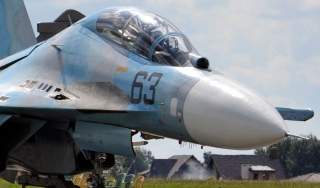Does China's J-11 Fighter Jet Have Russian SU-27 "DNA"?
We think so.
However, the J-11D lacks the engineering upgrades of the Su-35; the Russian fighter is more maneuverable, and capable of flying longer ranges with heavier weapons loads.
Flankers over the Pacific
Unlike earlier Chinese copies of Russian aircraft such as the A-5 and J-7,the J-11 series has not been exported—which must provide some minor consolation to Russia. Nor has it ever been used in combat.
One was involved in an incident on August 19, 2014, when a J-11 intercepted a U.S. Navy P-8 Poseidon near Hainan Island and made repeated passes at distances as short as twenty feet, prompting an exchange of complaints. This April, the deployment of sixteen J-11Bs to Woody Island in the South China Sea has also evoked a diplomatic protest from Vietnam.
On the whole the J-11B appears to be an adequate F-15–equivalent fighter—with later models possessing arguably more advanced electronics to their Russian equivalents. In fact, the J-11D and J-16 suggest that China is embracing U.S.-style networked warfare, emphasizing high-endurance platforms using beyond-visual-range missiles. However, a big question mark remains over the performance of China’s domestically produced engines.
Speaking of which—China had approached Russia about purchasing a small number of its hot new Su-35s. Mindful of what happened the last time, Russia initially declined to sell them in small numbers. In January 2016 China and Russia finally agreed to a larger order of twenty-four Su-35s for $2 billion. Many observers believe China’s principal motivation for the buy is to reverse-engineer the technology behind the Su-35’s new advanced AL-41FS vector-thrust turbofan engines.
One way or another, China will eventually develop high-performance jet engines. In the short term, the Russian aviation industry will do what it can to at least receive payment for its designs.
Sébastien Roblin holds a Master’s Degree in Conflict Resolution from Georgetown University and served as a university instructor for the Peace Corps in China. He has also worked in education, editing, and refugee resettlement in France and the United States. He currently writes on security and military history for War Is Boring.
This article first appeared in 2016. It is being republished due to reader interest.
Image: Reuters

